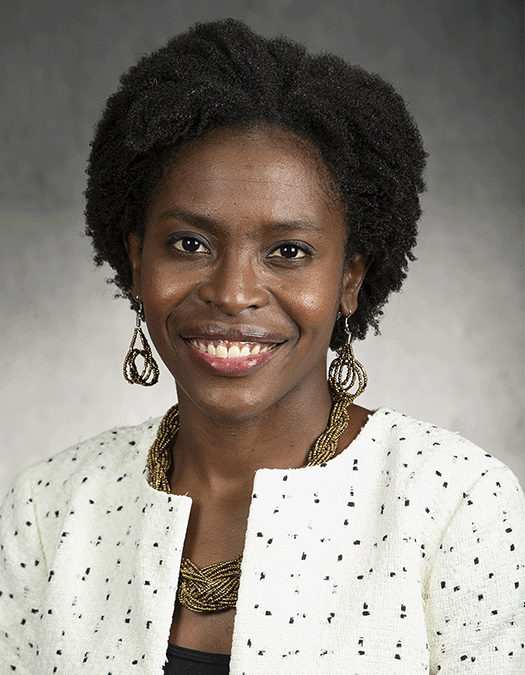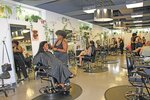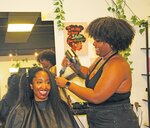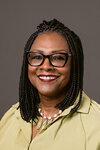By Talia McWright
Rosie Jablonsky brushed out the curly hair of a young girl, as stylists in the Mall of America salon gathered around. “She looks like a lion,” one stylist said. “She hates her hair,” the girl’s parents told Jablonsky. With the little girl in tears, Jablonsky knew that this would be one of her last times working at the salon.
“After that experience I was like, this isn’t my job,” Jablonsky said. “My job isn’t to make little girls hate their hair.”
Jablonsky studied film-making in college. Struggling with her career path, she made a list of what she wanted to do for work, which included: working on her feet and with her hands, being creative every day, working mostly with women, talking and telling stories, making a positive impact and being joyful. She also made a list of the things she was actively doing, one of which was cutting her friend’s hair, the only thing that ticked all the boxes. In 2008, Jablonsky studied at the Vogue College of Cosmetology, in Santa Fe, N.M., and noticed immediately the lack of curly hair education.
“I was raised in a pretty counter cultural family,” Jablonsky said. “I wasn’t really exposed to a lot of popular trends, and so I really didn’t understand how much curl hatred was in the world.”
After cosmetology school, Jablonsky moved to Minnesota, and worked at a salon in the Mall of America. The salon focused heavily on straightening systems and encouraged the insecurity of curly hair, she expressed. Soon after her time in the salon at the MOA, Jablonsky found the curly hair salon, Twisted Hare, (3401 Nicollet Ave. Minneapolis) on FaceBook and realized that a curly hair salon was where she belonged.
She wanted to work at a salon that made people feel like the best versions of themselves, not one that capitalized on insecurities. Working at Twisted Hare expanded her curly hair education, teaching methods like dry cutting where instead of cutting curly hair in a wet or straightened state, the hair is cut dry as it naturally falls.
In the past, she’d applied to jobs that had rules against curly hair and didn’t know at that time there was a history of legally controlling people’s hair. It was exciting to work at a place that helps people embrace their texture. She is also excited about the growth in curly hair centered salons across the state.
Jablonsky opened Curl Power in 2016 and wanted clients of different racial backgrounds, sexual orientations, and socioeconomic backgrounds to feel comfortable and safe being themselves in her business. The salon started as two locations, but Jablonsky closed the Franklin Ave. location in 2020 due to the COVID-19 pandemic. The second and current Minneapolis location opened in 2018. She expressed that together, her team of stylists create ideas around the different ways that they can help people love their hair.
“It was so easy to see that people loved what we were doing and needed it,” Jablonsky said.
An act to protect curly hair
On Feb. 1, 2023, Minnesota adopted the CROWN Act, a law that bans race based hair discrimination. According to, The Official CROWN Act website, the Acronym CROWN stands for, “Creating a Respectful and Open World for Natural Hair. It was created in 2019 by Dove and the CROWN Coalition, in partnership with then State Senator Holly J. Mitchell of California, to ensure protection against discrimination based on race-based hairstyles by extending statutory protection to hair texture and protective styles such as braids, locs, twists, and knots in the workplace and public schools.”
Jablonsky expressed that the CROWN Act creates a movement towards professionalism reflected in one’s natural state. Though Jablonsky has not experienced direct hair-based discrimination, she was given the nickname “Lion girl” growing up. The nickname is a place of tension for her as it holds both positive and negative associations. A lot of Jablonsky’s identity, especially for others, was tied to her hair and how her curly hair made her different from others. Though she is not always called, “Lion girl,” in a positive way, the nickname makes Jablonsky feel powerful.
“Take up your space,” Jablonsky said. “Be loud if you want to.”
Jablonsky explained that she understands that the issue is not just about hair discrimination, but that its roots lie in a system of racial discrimination. She said one thing she does to grow her awareness is try to educate herself, and her stylists, on anti-racist efforts. Curly hair gets called messy a lot, Jablonsky said. She explained it’s going to take a broad shift in the media especially for more representation of people with curly and textured hair going to work to be seen as professional.
“People of color, especially those with tighter texture, are often deemed unprofessional by White America. People view tight curls and texture as unpolished and unprofessional.”
There is no such thing as a hair type, as everyone’s hair is unique to them and has its own set of needs, Jablonsky said. She discussed the “Curly girl method,” an idea originally created by Lorraine Massey and Deborah Chiel in 2002, in her book, “Curly girl: The Handbook.” A catchphrase in the book is, “Where there’s frizz, there’s a curl waiting to happen.” This is an idea Jablonsky recommends against, because the fear of frizz is a remnant of a racist idea, and hair does not have rules.
“I would hope that this [The CROWN Act] opens doors for people to feel comfortable exploring their texture if they didn’t before,” Jablonsky said.
It’s not surprising to Jablonsky that 26 states have yet to adopt the CROWN Act, but it is disappointing. She believes there needs to be more awareness and education of the issue, and people should not worry about or be bothered by what others do with their hair.
Jablonsky wants to instill confidence in her clients, and ensure that they can walk away with techniques that will help them in achieving what they’d consider to be a, “good hair day,” because everyone deserves to feel confident in their hair, especially in the workplace. She thinks that it’s exciting to think that people will wear more natural styles, braids and locs at work, to the point that it becomes normalized.
“Love your body,” Jablonsky said. “Your hair is a part of your body. It’s natural.”
Stylist Ceyonn Wade
Ceyonn Wade, a North Minneapolis resident, has been natural for half of her life. For most of her childhood, her hair was chemically relaxed, which she said appealed to the Midwestern norm. At 27 years old, Wade said she’s gone natural because she loves and embraces her natural hair and Black culture.
Wade has been working at Curl Power since 2021. She studied cosmetology at Aveda Institutes, and expressed that she was not taught about how to care for curly hair. After touring the Curl Power salon and meeting Jablonsky, Wade said she knew she loved it. She especially loves the inclusivity of Curl Power in being LBTQIA+ allied and owned, how it’s open to everyone and has products for all hair needs.
“I felt like Curl Power fit who I was as a person,” Wade said.
Wade is happy someone acknowledged that curly hair, locs and other protective styles are professional in the Black community. She feels that the CROWN Act took initiative to bring it to life for the greater communities.
“When I first heard about it I was excited and ecstatic, and I still am,” Wade said. “But I feel like it’s so crazy that in order for us to not be discriminated against for wearing our hair naturally curly we have to have things like this in play for us to be safe as people of color.”
In elementary to middle school, Wade was often the only girl of color in her classroom. Though her hair was relaxed, it was often in protective styles like twists. She remembers other children and their parents passive aggressively commenting on her hair, and touching it, saying things like, “Oh, it’s a lot softer than I expected it to be,” or, “Oh my gosh, how can you take care of this much hair?” She expressed that these experiences made her feel like she wasn’t beautiful, made her question her hair when she had never before viewed it as a problem, and made her feel uncomfortable about who she was because her hair was a part of her.
“Nowadays, even before the CROWN Act came into play, people are like, ‘I love your hair,” Wade said.
Wade went natural as a sophomore in high school, and during the transition period felt really insecure about the way she looked. She hated her hair at the time. Once her hair grew into an afro, she began falling in love with it. At 18, she felt confident in her hair, and began experimenting more with different styles, and protection methods, so much so that others would ask her to style their hair.
During the earlier stages of the pandemic in 2021, Wade decided to cut her hair after being inspired by singer Ari Lennox, who had recently done a big chop. After cutting her hair, Wade said she cried for a long time. She’d spent so long growing it out, and couldn’t believe she’d just cut it. Then, it felt like a weight had been lifted from her shoulders.
She realized that so much of her identity was tied to her hair. From there, her growth journey began again with what she said was a healthier mindset and better products. The experience taught her so much about herself, and she is now able to be her authentic self without worrying about how others will judge her based on her hair.
“I can say I have a stronger bond with my hair now than I did before,” Wade said.
Wade expressed that many of her clients are not people of color, weren’t aware of the CROWN Act, and are shocked at the reality of the hair-based discrimination people of color experience. Wade said she’s surprised at the amount of people that were unfamiliar with the CROWN Act.
“A lot of times our hair is deemed as an obstacle in different industries, and career fields,” Wade stated.
Stylist Paige Graling
Growing up in Red Wing as a biracial girl with curly hair was difficult because most of the people around her had straight hair, or would straighten their hair, said Paige Graling. Her mom and grandparents tried to instill in Graling a love for her natural hair, but she said it was hard to feel confident when no one else had or wore their hair natural like her. It wasn’t until high school when she moved to the Twin Cities that she started seeing people of color with natural hair like hers, and began feeling more confident.
“But I feel like it wasn’t until I worked here, that I was like, ‘Oh now I actually know how to do my hair,” stated Graling.
Graling’s mom and grandparents encouraged her to pursue beauty school as they felt she was creative, and passionate about cosmetology. While studying at The Salon Professional Academy in Maplewood, Graling said that most of the people she styled had straight hair, and if they had natural or curly hair, it would be flat ironed or blown out.
“In school we really didn’t learn anything about curly hair, so even if we got people in with curly hair, we’d straighten it first, then cut it,” Graling said.
After graduating from beauty school, she first worked at a blow-out salon, then moved to Curl Power in 2020. Her experience at Curl Power was completely different from the past hair education she’d received. She said that in her early stages at Curl Power, she relied on what she knew about caring for her own natural hair when working with clients.
“Most of the stylists that graduated within 2019 and under will tell you that there was really no education at all for curly hair,” Graling said.
Straightened hair was a trend of the 2000s, and she loves that the CROWN Act now exists. In school as a child, she does not remember anyone wearing their hair in natural styles, including her teachers, and hopes that the CROWN Act will help people accept that part of themselves.
Graling was bullied in school growing up because of her natural hair. She said she had a lot of hair, and was made to feel that it was an inconvenience to others. Sitting in the front of class, she’d slouch and shrink herself to not disturb or block the view of others.
Teaching others about how to care for their natural hair is one of Graling’s passions. She wants to instill confidence in others about their curls, and is joyful about working in a salon that supports that. Still, she feels irritated by the amount of states that have yet to adopt the CROWN Act, and believes it is holding the country back.
“It’s a huge part of us, and who we are, but in political terms it’s hair,” Graling said. “Let us do what we want with it, let us not be discriminated against doing something that’s natural to us. It’s time.”
Stylist Celeste Gravatt
Uptown resident, Celeste Gravatt joined the Curl Power team in 2017 and calls it “home.” She said she’s always felt safe, supported and able to practice her craft without judgment.
As a child, Gravatt attended a Montessori school and was one of the few Black children in her school. She and her family were unsure of how exactly to style her hair, but did the best they knew how, using things like coconut oil to keep it moisturized. Gravatt said that in middle school, she cut all of her hair off because she was so tired of getting teased for it, and spent the next 20 years not knowing what to do with it.
At 27, she attended the, Bloomington Empire Beauty School to become a nail technician. In beauty school, Gravatt said she was taught that all hair was the same, and that if the techniques were not working from person to person, it was an issue with the stylist, not an issue of technique, an experience she found very frustrating. She was even once told during her education, that no one would want to wear their hair naturally curly, even though she herself has naturally curly hair. After school, she got a job as a nail tech at the Twisted Hare salon, which at the time was one of the only curly hair salons in Minnesota.
“It kind of landed in my lap,” she said. "It geard me towards what I was gifted towards."
Gravatt acknowledges that hair-based discrimination stems from institutionalized racism. She believes that a good first step in combating the issue would be to have more school curriculum about textured hair. She said that several states now have legislation that require students in beauty and cosmetology schools to learn how to do textured hair before graduating, and Minnesota is not one of them.
Gravatt said she spends a lot of time destigmatizing hair, and trying to reprogram people’s understanding of what is seen as professional. She tells people that they can wear their hair naturally curly and not have to fear repercussions of any kind, particularly in corporate settings. Many of her child clients are involved in activities like dance, and are told that they must wear their hair in specific styles even if their hair cannot be manipulated to fit the style.
“I love being able to empower those kids, and tell them that they can wear their hair the way that it grows,” Gravatt said. “Dance companies in particular need to adjust their perspective.”
In 2012, Gravatt said she put away the flat iron and never looked back. Now that she is well educated about curly and textured hair, she is growing her hair out for the first time since she was a kid.
“I really love my curls,” Gravatt said.






Comments
No comments on this item Please log in to comment by clicking here